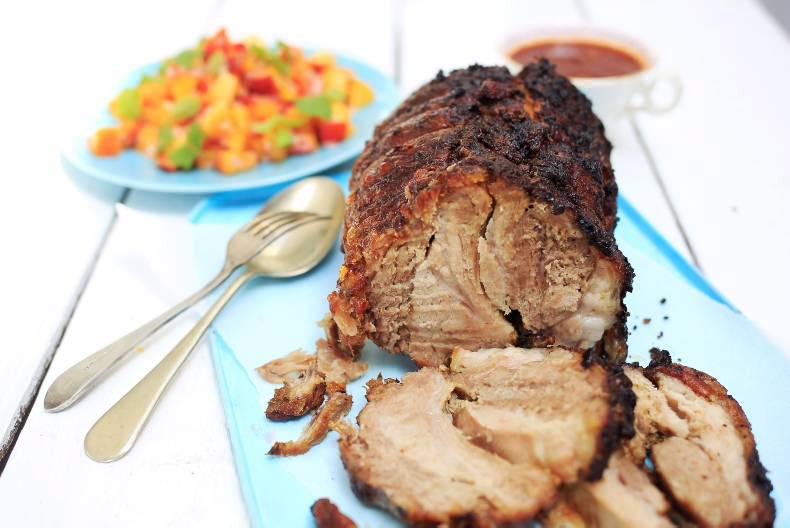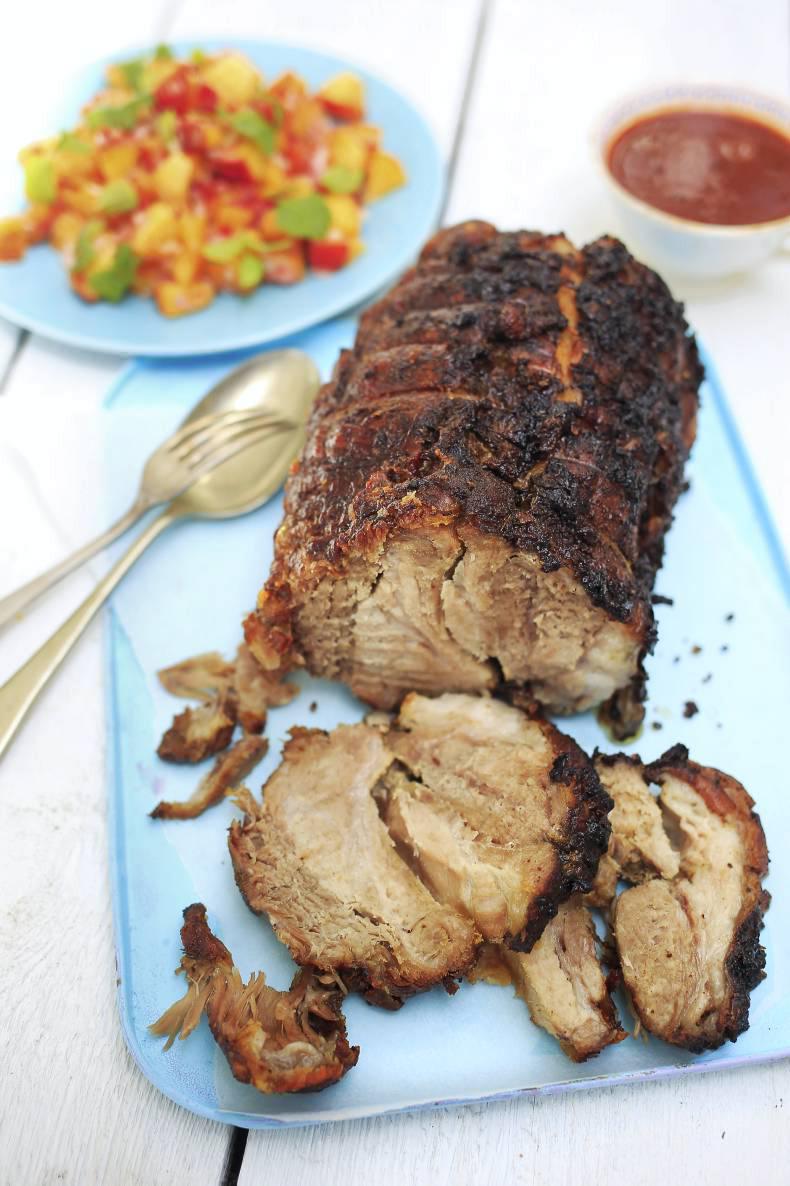I often say that we are an island and we should be eating more fish. Mackerel is plentiful and it is good value. This recipe also works well for hake, haddock, salmon or sea trout. And this is a fabulous way of cooking mackerel on a barbecue. They will never taste better. I would serve one as a starter and two for a main course.
People who like their Indian meals will be familiar with raita. It is so refreshing with a curry and it is perfect with this fish lunch. You can pretty much add any vegetable you enjoy into the mix
You will enjoy this slow roast pork with tropical peach salsa for a leisurely Sunday lunch. Shoulder is a very flavoursome cut and it is good value. Do try and get it with the crackling on. It takes hours to cook, but needs very little doing to it while it’s roasting, and it leaves you with plenty of time for everything else you have to get done.
Peaches are in season now and there is a great mix of tastes here. This salsa is also good with pork chops or duck breasts.
Spiced mackerel with vegetable raita
Serves four to eight
1 tbsp coriander seeds
1 tbsp black mustard seeds
1 tbsp cumin seeds
1 tsp black peppercorns
1 hot dried chilli, roughly chopped and seeded, if wished
1 tsp salt
1 tbsp dark brown sugar
8 x 75g (3oz) mackerel fillets
Donegal rapeseed oil, for brushing (if using a griddle pan)
For the vegetable raita:
½ cucumber, peeled, halved, seeded and diced
1 plum tomato, seeded and diced
1 small onion, very finely chopped
1 cooked potato, peeled and diced
½ tsp toasted cumin seeds
300ml (½ pint) thick Greek yoghurt
1 tbsp chopped fresh mint
Sea salt and freshly ground black pepper
1 To make the spice paste for the mackerel, heat a dry frying pan over a medium heat, then add the coriander, black mustard and cumin seeds with the peppercorns and toast for two to three minutes, shaking from time to time until the mustard seeds are popping and the spices are aromatic. (You may need to cover the frying pan to stop the mustard seeds jumping out).
2 Blend the toasted spices and chilli to a smooth powder in a coffee grinder or with a pestle and mortar. Combine the spice powder with a teaspoon of salt and the sugar. Store in an airtight container until needed.
3 To make the vegetable raita, place the cucumber in a bowl with the tomato, onion, potato and cumin seeds. Stir in the Greek yoghurt and mint, then season to taste. Cover with cling film and chill until needed. It will keep happily in the fridge for up to two days.
4 Half an hour before cooking the fish, lightly sprinkle both sides of each mackerel fillet with the spice mixture – about two teaspoons per fillet. Store any remaining spice mixture for future use.
5 For ease of turning, place the spiced mackerel fillets in a metal-hinged rack and cook on a hot barbecue for one to two minutes each side, until lightly charred and firm to the touch. Alternatively, you can cook them on a griddle pan that has been lightly brushed with oil over a medium to high heat.
6 Arrange the spiced mackerel fillets on plates and spoon the vegetable raita on the side to serve.
Slow-roast pork with tropical peach salsa
Serves six to eight
4 garlic cloves, crushed
1 tbsp freshly grated root ginger
1 tbsp sea salt
2 tbsp jerk seasoning
1 tbsp light brown sugar
1-2 tbsp dark rum (optional)
1 tbsp Donegal rapeseed oil
3kg (6½lb) boned and rolled shoulder of pork, rind scored
120ml (4fl oz) dry white wine
For the peach salsa:
4 firm peaches, diced (stones discarded)
½ red chilli, seeded and finely chopped
1 tsp freshly grated root ginger
Finely grated rind and juice of 1 lime
½ small red onion, finely chopped
1 heaped tsp chopped fresh mint
1 heaped tsp chopped fresh coriander
Sea salt and freshly ground black pepper
1 Preheat the oven to 230°C/450°F/gas mark 8. Place the garlic, ginger, sea salt, jerk seasoning, sugar, rum (if using) and oil in a pestle and mortar and crush to make a paste. Using your hands, rub this mixture into the pork rind, pushing it well into the slits. Place the pork, rind-side up, on a rack in a large roasting tin and roast on the middle shelf of the hot oven for 30 minutes.
2 Remove the pork from the oven and turn the temperature down to 150°C/250°F/gas mark 2. Turn the pork over so the rind is on the bottom and return to the oven to cook very slowly for at least five to six hours. Halfway through the cooking time pour 225ml (8fl oz) of water into the roasting tin, turn the pork rind-side up again, baste with the juices in the tin and continue to cook.
3 To make the salsa, tip the diced peach flesh into a bowl, add the chilli, ginger, lime rind and juice onion and herbs. Season to taste and set aside for at least 30 minutes to allow the flavours to develop.
4 About 30 minutes before serving the roast pork, turn the oven temperature up to 220°C/425°F/gas mark 7. Transfer the pork to a clean roasting tin and cook at the higher heat for about 20 minutes to crisp up the rind. Keep an eye on the meat to make sure the rind crackles rather than burns. Remove from the oven and leave to rest in a warm place for 20 minutes.
5 While the pork is resting, make the gravy. Spoon off any excess fat from the first roasting tin, add the white wine and place over a low heat. Bring slowly to the boil, stirring well to incorporate any bits from the bottom of the tin. Simmer for a couple of minutes, season and strain into a jug.
6 Cut the pork into thick slices and arrange on warmed plates. Serve with the bowl of tropical peach salsa and jug of gravy. CL






 This is a subscriber-only article
This is a subscriber-only article











SHARING OPTIONS: